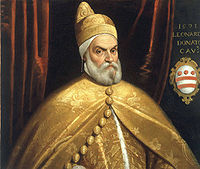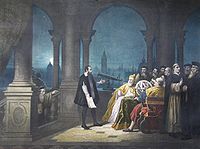
Leonardo Donato
Encyclopedia

Venice
Venice is a city in northern Italy which is renowned for the beauty of its setting, its architecture and its artworks. It is the capital of the Veneto region...
, February 12, 1536 – Venice, July 16, 1612) was the 90th Doge of Venice
Doge of Venice
The Doge of Venice , often mistranslated Duke was the chief magistrate and leader of the Most Serene Republic of Venice for over a thousand years. Doges of Venice were elected for life by the city-state's aristocracy. Commonly the person selected as Doge was the shrewdest elder in the city...
, reigning from January 10, 1606 until his death. His reign is chiefly remembered for Venice's dispute with the papacy, which resulted in Pope Paul V
Pope Paul V
-Theology:Paul met with Galileo Galilei in 1616 after Cardinal Bellarmine had, on his orders, warned Galileo not to hold or defend the heliocentric ideas of Copernicus. Whether there was also an order not to teach those ideas in any way has been a matter for controversy...
placing a papal interdict
Interdict (Roman Catholic Church)
In Roman Catholic canon law, an interdict is an ecclesiastical censure that excludes from certain rites of the Church individuals or groups, who nonetheless do not cease to be members of the Church.-Distinctions in canon law:...
on Venice 1606-1607.
Background, 1536-1606
The son of Giovanni Battista Donato and Giovanna Corner, Donato was born into a merchant family. Through his shrewd business sense, he was able to turn his family's average amount of wealth into a fortune.His wealth established, Donato began a public career in Venice, serving in turn as the Venetian ambassador
Ambassador
An ambassador is the highest ranking diplomat who represents a nation and is usually accredited to a foreign sovereign or government, or to an international organization....
to Constantinople
Constantinople
Constantinople was the capital of the Roman, Eastern Roman, Byzantine, Latin, and Ottoman Empires. Throughout most of the Middle Ages, Constantinople was Europe's largest and wealthiest city.-Names:...
, podestà
Podestà
Podestà is the name given to certain high officials in many Italian cities, since the later Middle Ages, mainly as Chief magistrate of a city state , but also as a local administrator, the representative of the Emperor.The term derives from the Latin word potestas, meaning power...
of Venice, and as governor
Governor
A governor is a governing official, usually the executive of a non-sovereign level of government, ranking under the head of state...
and procurator of San Marco
Procurator of San Marco
The office of Procurator of San Marco was the second most prestigious life appointment in the Republic of Venice .-History:...
.
Donato later served as the Venetian ambassador to the Vatican
Holy See
The Holy See is the episcopal jurisdiction of the Catholic Church in Rome, in which its Bishop is commonly known as the Pope. It is the preeminent episcopal see of the Catholic Church, forming the central government of the Church. As such, diplomatically, and in other spheres the Holy See acts and...
and lived at Rome
Rome
Rome is the capital of Italy and the country's largest and most populated city and comune, with over 2.7 million residents in . The city is located in the central-western portion of the Italian Peninsula, on the Tiber River within the Lazio region of Italy.Rome's history spans two and a half...
for many years. His opposition to the ambitions of the papacy led him to conflict with Cardinal Borghese, the future Pope Paul V
Pope Paul V
-Theology:Paul met with Galileo Galilei in 1616 after Cardinal Bellarmine had, on his orders, warned Galileo not to hold or defend the heliocentric ideas of Copernicus. Whether there was also an order not to teach those ideas in any way has been a matter for controversy...
. Donato's staunchly anti-papal stance led to rumours that he was secretly a Protestant, although historians have not found any evidence of this.
Reign as Doge, 1606-1612
Donato became one of the candidates for Doge upon the death of Marino GrimaniMarino Grimani (doge)
Marino Grimani was the 89th Doge of Venice, reigning from April 26, 1595 until his death. Grimani's reign as doge was principally remembered for two reasons: the splendid celebrations for the coronation of his wife, Morosina Morosini; and the beginning of the quarrel with the papacy that...
on December 25, 1605. Donato faced two opponents in this election (including Marcantonio Memmo
Marcantonio Memmo
Marcantonio Memmo was the 91st Doge of Venice, reigning from July 24, 1612 until his death.-Background, 1536-1612:...
, who would eventually succeed him as Doge), but ultimately received both of their support, resulting in his election as Doge on January 10, 1606.
Donato inherited a conflict with the papacy from Grimani: Between 1601 and 1604, Venice, under Grimani's leadership, had passed a number of laws limiting the power of the papacy within the Republic of Venice
Republic of Venice
The Republic of Venice or Venetian Republic was a state originating from the city of Venice in Northeastern Italy. It existed for over a millennium, from the late 7th century until 1797. It was formally known as the Most Serene Republic of Venice and is often referred to as La Serenissima, in...
and withdrawing a number of clerical privileges. This came to a head in late 1605 when Venice charged two priests as common criminals, thus denying their clerical immunity from facing charges in secular courts. On December 10, 1605, two weeks before Grimani's death, Pope Paul V sent a formal protest to Venice.
Shortly after his election as Doge, Donato, at the urging of Paolo Sarpi
Paolo Sarpi
Fra Paolo Sarpi was a Venetian patriot, scholar, scientist and church reformer. His most important roles were as a canon lawyer and historian active on behalf of the Venetian Republic.- Early years :...
, rejected Paul V's protest. As a result, in April 1606, Paul V issued a papal interdict
Venetian Interdict
The Venetian Interdict of 1606 and 1607 was the expression in terms of canon law, by means of a papal interdict, of a diplomatic quarrel and confrontation between the Papal Curia and the Republic of Venice, taking place in the period from 1605 to 1607...
on Venice, thus excommunicating the entire Venetian population. At Sarpi's urging, Donato ordered all Roman Catholic clergy
Clergy
Clergy is the generic term used to describe the formal religious leadership within a given religion. A clergyman, churchman or cleric is a member of the clergy, especially one who is a priest, preacher, pastor, or other religious professional....
to ignore the Pope's interdict and continue to perform the mass
Mass (liturgy)
"Mass" is one of the names by which the sacrament of the Eucharist is called in the Roman Catholic Church: others are "Eucharist", the "Lord's Supper", the "Breaking of Bread", the "Eucharistic assembly ", the "memorial of the Lord's Passion and Resurrection", the "Holy Sacrifice", the "Holy and...
, on pain of immediate expulsion from the Venetian Republic. The Venetian clergy all continued to perform mass, except for the Jesuits, who left the Republic (or were expelled depending on one's perspective) rather than violate the papal interdict. The Jesuits would not return to Venice until 1655. Donato and Sarpi were also personally excommunicated by Paul V.

Kingdom of France
The Kingdom of France was one of the most powerful states to exist in Europe during the second millennium.It originated from the Western portion of the Frankish empire, and consolidated significant power and influence over the next thousand years. Louis XIV, also known as the Sun King, developed a...
acted as a mediator in the dispute between Venice and the papacy. On April 21, 1607, a deal was reached under which the two priests that Venice had charged as common criminals would be handed over to French custody, and, in exchange, the pope would remove the interdict against Venice.
The remainder of Donato's reign as Doge is largely without note. Donato was not at all popular with the Venetian crowd
Crowd
A crowd is a large and definable group of people, while "the crowd" is referred to as the so-called lower orders of people in general...
, so, after his first year as Doge, Donato significantly restricted his public appearances as Doge. Many rumours circulated about the reclusive Donato during these years, but none were ever substantiated. He died on July 16, 1612.

